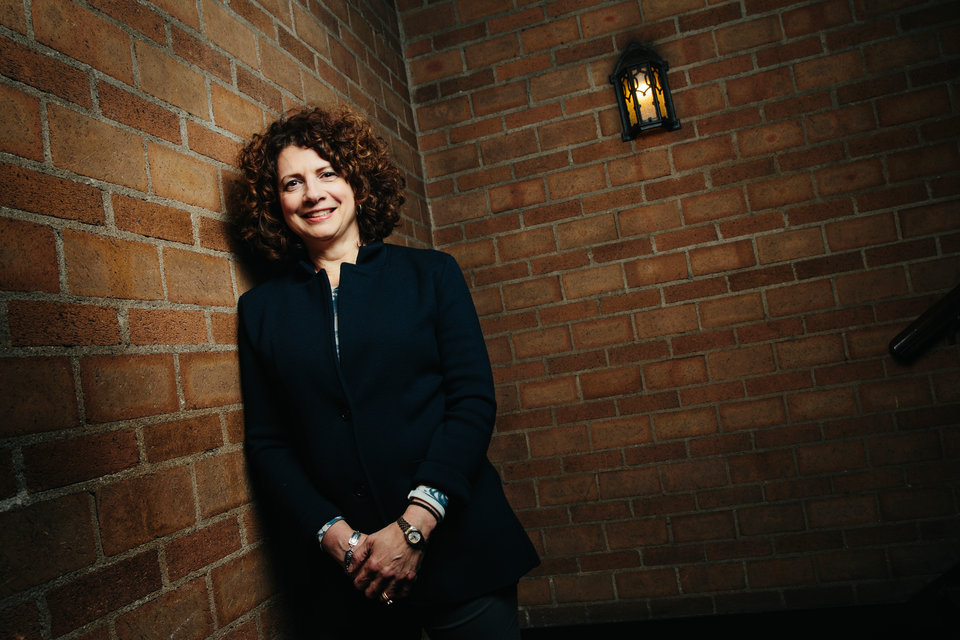“There’s the underlying moral compass St. Thomas has and the students have. Whatever religion you are – Muslim, Jew, Lutheran, Protestant, Orthodox or Catholic – it doesn’t matter because of that underlying moral compass. That was important to me.”
Last spring, Katherine Boosalis ’81 was beside herself as she walked around the St. Thomas campus with her son, Theodore ’17, and father, Demos Hadjiyanis, a retired St. Thomas economics professor. With three generations of her family together at a place where their roots were deep, it was hard not to hide her joy.
“It was exciting for me to take pictures of my dad and my son – in front of the Arches, in front of the Anderson Student Center, in front of the fountain,” Boosalis said. “I know it made my dad really proud. And it made me proud, too. My son, who was a finance major, loved his experience there. It will always be a really great memory, especially for my father.”
Boosalis was part of the first St. Thomas coed class. She majored in economics and continued her education at the Opus College of Business. While she started her career with a job in technical support, she transitioned to marketing after receiving her MBA in 1987. Currently she’s the marketing communications manager for Bloomington-based Det-Tronics, a unit of United Technologies Corporation, specializing in high-hazard fire and gas-safety systems.
“I wear multiple hats, which I love,” she said. “I found my niche – a midsize company, where I have some autonomy and can help drive strategy.”

Katherine Boosalis' father, Demos, and son, Theodore, pose for a photo outside the St. Thomas Arches.
Boosalis’ St. Thomas memories go back to childhood. The daughter of immigrants – her dad from Cyprus and mom from Greece – education was always paramount in her family; her dad took a teaching position in the Economics Department when she was just 5. The university wasn’t just part of her father’s life; it was integrated in the family’s social life as fellow faculty and their families became close friends.
Boosalis expected to attend nearby St. Catherine University, but that changed as soon as St. Thomas introduced coeducation in fall 1977. Along with taking challenging classes she created strong bonds with fellow students, especially her sorority sisters in Gamma Sigma Sigma.
“It was a good way to form a bond with other women,” she said. “It was a service sorority and, to this day, those women are still my friends. There’s a group of about 12 of us and we get together throughout the course of the year. We’ve seen each other through weddings, babies, parents passing away – big life events.”
Being the daughter of a professor on campus definitely came with perks, like a prime parking spot and being familiar with faculty. But there was no playing favorites or special treatment from anyone, she said.
“It was unusual being a professor’s child on campus,” she said. “It was a good thing and a bad thing. My father was known as a difficult professor. I was an econ major and managed to avoid taking a class with him, which I think was wise. But he was my tutor when I needed him.
“My parents are an inspiration to me in how they treat each other and how they respect each other,” she said about her father and mother, Eugenia. “My dad is a great listener and very articulate. He’s got a wonderful sense of humor. They taught me it’s important to be constantly eager to learn and listen. To ask questions and not jump to conclusions.”
A Greek Orthodox, Boosalis says she felt comfortable on a Catholic campus and appreciated religious debates with fellow Tommies from various backgrounds.
“There’s the underlying moral compass St. Thomas has and the students have,” she said. “Whatever religion you are – Muslim, Jew, Lutheran, Protestant, Orthodox or Catholic – it doesn’t matter because of that underlying moral compass. That was important to me.”







